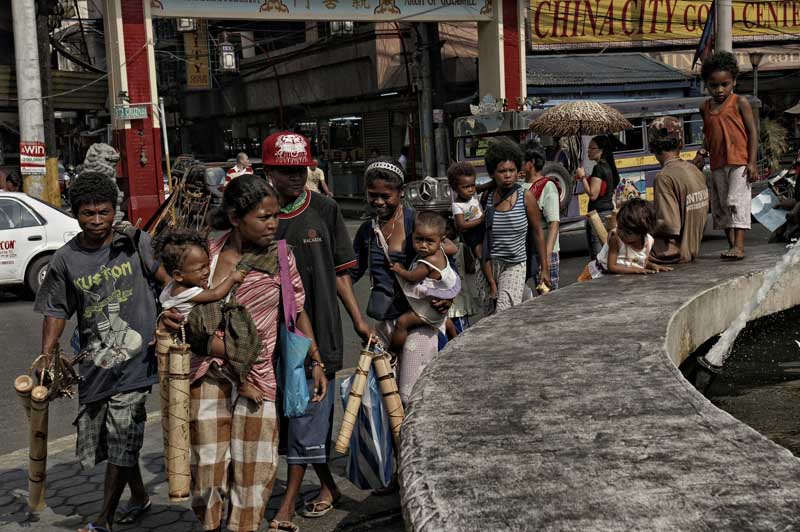
What really estranged me after the 1991 Mt. Pinatubo Eruption was not the ash fall but the flock of small stature, black curly hair and dark skinned people along the side streets. Then, I quickly remembered our History lesson that they were our ancestors from whom we were originated. “Oh, they are true”, I said to myself. But it was not a great feeling actually. Their distinct and unusual characteristics feared me so much, thinking that they were ‘aliens’, ‘strangers’, and ‘outcasts’. Never had the chance to know them well since there were limited information about them. Even our books in school could not even tell.
These people we used to call then as “Ita (Ayta)” struggled much in the plains. They were bullied, hurt and discriminated. For two years of their settlement in our town plaza, their existence was never accepted. They became laughing stock saying, “And’yan na lolo/lola mo”. They were used to scare those unruly children by their parents as “Kakainin ka nila kaya ‘wag matigas ulo mo.”
Until one time I did not see them anymore in their places. My father then told me that they were able to find their ‘real’ homes. I asked him, “Where can we find their homes?” He answered me, “at the mountains”. “So the place where they really belong”, I said to myself.
It is not really clear to me why they should be like that. Why do they look different from us? Why do they not go to school? Why do they remain unchanged in our time? I even pitied them and said to myself that I am more fortunate to have my home, education and a life far different from them.
When I have given a special assignment to work on Indigenous Peoples Education (IPEd), finally, I got answers to my questions. Reflections came in. I even pitied myself.
As the history tells us in the IP perspective, their existence is truly a reflection of our indigenous culture. They are the ‘real’ full-blooded Filipinos. We owe to them our culture. What we are now and what we have now are purely products of colonization, the assimilation brought by the colonial minds. That made me feel sorry that I am ‘miseducated’.
Looking back the primitive years of our country, these ‘katutubo’ were the few who chose to remain their identity against colonialism. Despite the changes and transformation brought by the colonial education, they even made their culture preserved and accumulated. Their ethnicity made them unique and even different from the majority who embraced the development of our times. Since then they have been neglected, marginalized and became less privilege.
Actually, we have to be proud of these IPs for they are able to survive in the changing time because of their indigenous knowledge systems and practices (IKSP) which later open us doors to see our “origin” and “real self”. With this knowledge, they are not really uneducated as others may perceive because of their primitive life and customary governance in their community. Their life experiences are their survival tools. Truly, they are the first engineers, architects, teachers, doctors, etc., for they have established their knowledge systems of facts, methods, skills, theories and values in their community. They are even leaders and strict with their customary laws. Their laws become their standards of maintaining peace and order among themselves. They respect one another and believe in their elders and chieftains. There is a fair government and respect to their leaders.
They are even more knowledgeable than us especially on taking care of our environment. We have to be thankful for them for taking care of our natural resources. Their communion with nature remains sacred until today. They are the true environmentalists, knowing how to conserve and preserve our environment. Also, they communicate with the nature or ‘kalikasan’ and ask answers for their struggles in life.
Their community is their school that provides great learning experiences that made them even educated, adaptive and experienced. I realized that technological enhancement is not an assurance of quality learning for survival. For the IPs, the nature, their ancestral domain and their indigenous learning system (ILS) are enough to live.
Several mandates are formulated for their recognition and honor—RA 8371 (Indigenous Peoples’ Rights Act of 1997), DepEd Order No. 62, s. 2011 (National Indigenous Peoples Education Policy Framework), and RA 10533 (Enhanced Basic Education Act of 2012). These formulated policies give equal rights and opportunities for our ‘katutubo’. Truly, they deserve gratitude and respect from the majority people and the government. They should not see ourselves over them for they, likes us, have something to share to us, that even they have rich culture than us.
I really feel sorry for myself that I would not able to see the significance of the IPs during my early years. Their worth has been neglected and marginalized by many. Their existence has been corrupted by our colonial thinking—greater are the ‘educated’ ones who are able to go to formal school. Thanks to the Department of Education who gives IPs attention and concern to prove their worth and are able to share their cultures to our young generation.
It is high time for them to be recognized as silent ‘heroes’ of our time. Their culture is our mirror of what we were in the past and our door to see our true identity—free from colonial influence.
Read:
- Colonial Education and National Development in Philippine Education
- The 21st Challenge in Education: Say ‘No’ to Banking Instruction
- Digital Storytelling in English Class: A Multimedia Learning Experience
- Computer-Supported Collaborative Learning (CSCL) in Classroom Instruction
- Media Text: A New Form of Literary Instruction